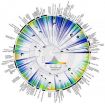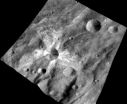(Press-News.org) A landmark project that has sequenced 1,092 human genomes from individuals around the world will help researchers to interpret the genetic changes in people with disease.
The first study to break the '1000 genomes barrier' will enable scientists to begin to examine genetic variations at the scale of the populations of individual countries, as well as guiding them in their search for the rare genetic variations related to many diseases.
The vast majority of genetic variation is shared with populations around the world but it is thought that a lot of the contribution to disease may come from rare variants of genes, found in 1 in 100 people or fewer. Researchers need to find these rare variants to see who has them and work out how they might contribute to a range of conditions from multiple sclerosis to heart disease and cancer.
The international team behind the 1000 Genomes Project found that rare gene variants tend to be restricted to particular geographic regions, because they typically arise from more recent mutations since humans spread across the world. By, for the first time, drilling down to genetic variants occurring at the scale of 1 in 100 people this study will enable researchers to interpret an individual's genome in the context of the genetic variation found in their own national population: identifying differences between genomes from 14 countries from Europe (including the UK) the Americas, East Asia and Africa.
A report of the research is published this week in the journal Nature.
'We are all walking natural experiments; some of our genes are switched off, some are active, whilst others are overactive,' said Professor Gil McVean of Oxford University, the lead author for the study. 'Our research has found that each apparently healthy person carries hundreds of rare variants of genes that have a significant impact on how genes work, and a handful (from two to five) of rare changes that have been identified as contributing to disease in other people.
The study has been designed so that, as well as the genome data, researchers have access to living cells (cell lines) from all 1,092 of the individuals whose genomes have been sequenced. Scientists can now study how differences in the biology of these cells correlate with genetic differences.
'There are variations that jump out from the data as looking 'a bit bad for you', for example mutations in regions that regulate genes are likely to be 'bad news' – possibly doing something dramatic to how cells behave,' said Dr Richard Durbin from the Wellcome Trust Sanger Institute, co-chair of the 1000 Genomes Project. 'Using our data you can now look to see if natural selection has been getting rid of such mutations – giving you a clue as to how harmful these variants might be.'
The team's work is already being used to screen cancer genomes for mutations that might identify therapeutic pathways, to interpret the genomes of children with developmental disorders and to pin-point variation that leads to increased risk for complex diseases such as heart disease or multiple sclerosis.
Professor Gil McVean of Oxford University said: 'Our research shows that you can take localism much further: for example, even just within the UK, Orkney islanders will have different variations from mainlanders, and will be different again from those from other nearby islands. In the future we would like to reach the scale of having a grid of individuals giving us a different genome every couple of square kilometres but there is a long way to go before we can make this a reality.'
Sir Mark Walport, Director of the Wellcome Trust who part-funded the study, said: 'It is quite remarkable that we have gone from completion of the first human genome sequence in 2003 to being able to sequence more than a 1000 human genomes for a single study in 2012. This study is an important contribution to our understanding of human genetic variation in health and disease and the DNA sequences are freely available for analysis and use by researchers.'
### END
1000 genomes study is 'guidebook' to how genes vary
2012-11-01
ELSE PRESS RELEASES FROM THIS DATE:
When people worry about math, the brain feels the pain
2012-11-01
When people worry about math, the brain feels the pain
Mathematics anxiety can prompt a response in the brain similar to when a person experiences physical pain, according to new research at the University of Chicago.
Using brain scans, scholars determined that the brain areas active when highly math-anxious people prepare to do math overlap with the same brain areas that register the threat of bodily harm—and in some cases, physical pain.
"For someone who has math anxiety, the anticipation of doing math prompts a similar brain reaction as when they experience pain—say, ...
Patients with diabetes left in the dark
2012-11-01
Patients newly diagnosed with type 2 diabetes feel "left in the dark" and unsure what they can and can't eat whilst sometimes waiting months to receive diabetes education, according to a new study published online today in the journal Primary Health Care Research & Development (1). The research carried out by Dr Michelle McKinley and colleagues at Queen's University Belfast, explored the views of people recently diagnosed with diabetes and discovered that whilst waiting for a referral to a diabetes education programme, they received little or no information about what to ...
Alcohol increases activity of the resting brain in social drinkers
2012-11-01
Short-term alcohol intake can increase the activity of functional connections across the human brain when it is at rest, according to research published Oct 31 in the open access journal PLOS ONE by Panagiotis Bamidis and colleagues from the Aristotle University of Thessaloniki, Greece.
Previous studies have shown that alcohol intake increases transmission of signals by the neurotransmitter GABA, present in 40% of the connections between nerve cells in the brain. Here, the researchers monitored resting brain activity in healthy social drinkers who had consumed one drink, ...
Exhaustive family tree for birds shows recent, rapid diversification
2012-11-01
New Haven, Conn. — A Yale-led scientific team has produced the most comprehensive family tree for birds to date, connecting all living bird species — nearly 10,000 in total — and revealing surprising new details about their evolutionary history and its geographic context.
Analysis of the family tree shows when and where birds diversified — and that birds' diversification rate has increased over the last 50 million years, challenging the conventional wisdom of biodiversity experts.
"It's the first time that we have — for such a large group of species and with such a ...
First ever family tree for all living birds reveals evolution and diversification
2012-11-01
The world's first family tree linking all living bids and revealing when and where they evolved and diversified since dinosaurs walked the earth has been created by scientists from the University of Sheffield.
Experts used the family tree to map out where the almost 10,000 species of birds live to show where the most diversification has taken place in the world.
Researchers, from the University of Sheffield, Yale University, University of Tasmania and Simon Fraser University, say the creation of new species has speeded-up over the last 50 million years. Surprisingly, ...
High blood pressure damages the brain in early middle age
2012-11-01
Uncontrolled high blood pressure damages the brain's structure and function as early as young middle-age, and even the brains of middle-aged people who clinically would not be considered to have hypertension have evidence of silent structural brain damage, a study led by researchers at UC Davis has found.
The investigation found accelerated brain aging among hypertensive and prehypertensive individuals in their 40s, including damage to the structural integrity of the brain's white matter and the volume of its gray matter, suggesting that vascular brain injury "develops ...
Protoplanet Vesta: Forever young?
2012-11-01
Like a movie star constantly retouching her makeup, the protoplanet Vesta is continually stirring its outermost layer and presenting a young face.
New data from NASA's Dawn mission show that a common form of weathering that affects many airless bodies like Vesta in the inner solar system, including the moon, surprisingly doesn't age the protoplanet's outermost layer.
The data also indicate that carbon-rich asteroids have been splattering dark material on Vesta's surface over a long span of the body's history.
The findings are described in two papers published ...
Assembly not required
2012-11-01
Cambridge, Mass. - October 31, 2012 - Scientists have created new kinds of particles, 1/100th the diameter of a human hair, that spontaneously assemble themselves into structures resembling molecules made from atoms. These new particles come together, or "self-assemble," to form structures in patterns that were previously impossible to make and hold promise for manufacturing advanced optical materials and ceramics.
The method, described in the latest issue of the journal Nature, was developed by a team of chemists, chemical engineers, and physicists at New York University ...
Virtual reality 'beaming' technology transforms human-animal interaction
2012-11-01
Using cutting-edge virtual reality technology, researchers have 'beamed' a person into a rat facility allowing the rat and human to interact with each other on the same scale.
Published today in PLOS ONE, the research enables the rat to interact with a rat-sized robot controlled by a human participant in a different location. At the same time, the human participant (who is in a virtual environment) interacts with a human-sized avatar that is controlled by the movements of the distant rat. The authors hope the new technology will be used to study animal behaviour in ...
Global genome effort seeks genetic roots of disease
2012-11-01
By decoding the genomes of more than 1,000 people whose homelands stretch from Africa and Asia to Europe and the Americas, scientists have compiled the largest and most detailed catalog yet of human genetic variation. The massive resource will help medical researchers find the genetic roots of rare and common diseases in populations worldwide.
The 1000 Genomes Project involved some 200 scientists at Washington University School of Medicine in St. Louis and other institutions. Results detailing the DNA variations of individuals from 14 ethnic groups are published Oct. ...



